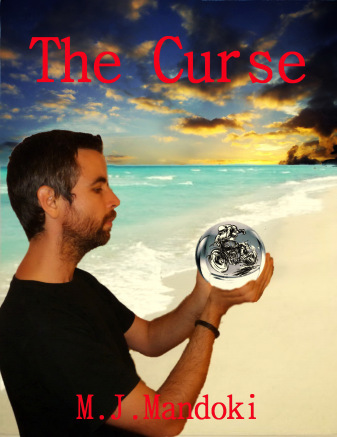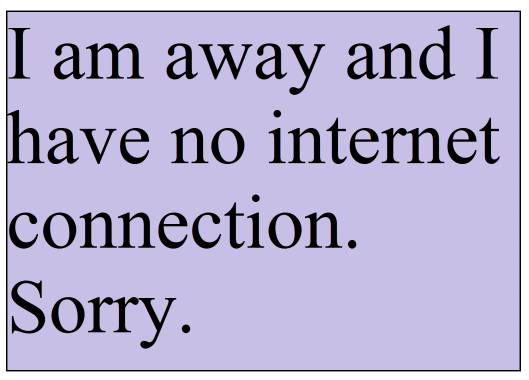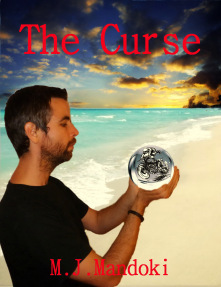M.J. Mandoki's Blog, page 7
September 12, 2016
More Successes to Share

 I have received two more congratulatory letters this week from Polar Expressions Publishing. Both my short story and my poem made it into the top group in a writing contest. This means that my short story, “The Dance of the Fairies,” will be published in an anthology, entitled Shoreline (2016) and, my poem, “The Old Willow’s Plea,” will be published in a poetry collection, entitled Overture (2016). Now, I am short of just one more publication to make it to four publications by traditional publishing houses in order to qualify for the application of a writer’s grant offered every year by the Canada Council for the Arts. In addition, I am still in the running for top prices in the contest.
I have received two more congratulatory letters this week from Polar Expressions Publishing. Both my short story and my poem made it into the top group in a writing contest. This means that my short story, “The Dance of the Fairies,” will be published in an anthology, entitled Shoreline (2016) and, my poem, “The Old Willow’s Plea,” will be published in a poetry collection, entitled Overture (2016). Now, I am short of just one more publication to make it to four publications by traditional publishing houses in order to qualify for the application of a writer’s grant offered every year by the Canada Council for the Arts. In addition, I am still in the running for top prices in the contest.
I am posting my successes, partly, to inspire other writers: passionate work pays off!


September 5, 2016
The Business of Universities: The Intellectual Cost of Mixing Business with Higher Learning

The corporatization of universities has been going on for decades. The operation of universities is increasingly shaped in line with business interests. The critics of this process are many and growing louder as the years go by. In this article, I would like to focus on the problem of the intellectual cost the higher education system has to pay for mixing business with higher learning.
The corporate system is undeniable. More and more sponsors are appearing at universities to fund scientific studies. Joel Westheimer, in his article points out that 52% of medical research is now funded by private companies. Also, the university system is continuously transformed by a top-down approach where the business-educated administrators on top are increasingly controlling the direction of universities. The educators; the professors, research and teaching assistants; on the bottom are beginning to be treated just a little more than hired help to fulfill the vision of these administrators. Yes, the corporate system is eroding the traditional reliance on highly educated professors who serve the public interest. The corporate system is now at work at universities.
Besides the many financial, social and democratic problems this corporatized system may have, which the critics have already pointed out, there is also a price to pay in terms of intellectual cost. The most obvious cost is the transfer of power from the highly educated professors to the business-oriented administrators. Surely, business administrators are well-educated, too. However, their education is centered around the successful running of businesses and not around the assurance of the students’ well-rounded education to properly participate in the public domain. The professors understand the students’ needs that go way beyond getting a job after university. They are proficient at discovering the student’s strengths and aptitudes to steer him or her in the right direction for a lifelong career the student can love, cherish and contribute to. They have the ability to empower a student to be a valuable, ethical and responsible person and citizen. To remove power from the professors to serve the business needs of the university means to rob students from getting a well-rounded education in favour of gaining a job.
The students are paying the highest price in this process. They are not only robed of a well-rounded education, but also lose out on the higher skills that universities are normally associated with. While the colleges were always job oriented, university educated people had the ability to think critically, solve problems, see the bigger picture in life and point to potential solutions on a large scale, anything from small business operations to great political changes in a country. To teach these higher level skills always involved traditional subjects, such philosophy, history, languages, psychology, social and political sciences, just to name a few. For example, a philosophy class is not geared toward getting a job, but it certainly teaches the student to see all sides of the question to understand a complex situation. To devalue and to remove these subjects in favour of those that are directly related to gaining employment means to leave students without those higher skills that allow them to be leaders of humanity, as opposed to become followers of a business model and simply hired help for successful businesses.
The overall intellectual cost can be very high in society. People who are unable to think critically are easily fooled by corrupt politicians and wicked business leaders. People who are taught to solve localized business issues cannot offer a new and ethical future direction of a business. People who cannot see the big picture in life feel helpless in solving their own life issues and the issues their society face at large. Without a proper higher education, a society can erode and be driven into the ground. If people are directionless and helpless, unethical and corrupt practices can easily take place in a country and, society can easily be destroyed by egotistic and selfish people who do not care about the greater good of the country and the citizens in it.
In addition, the business model can also destroy the university system altogether. Since the business model supports the idea of education at the lowest costs and the fastest speed with the greatest possible profit, the entire education system is geared toward mass producing graduates at a super speed. The university system is now not just competing with colleges but also with certificate programs that the hiring businesses accept. As Michael Staton argues, the higher degree is doomed because hiring businesses are looking at other factors, such as certifications, work samples, manager reviews and on-line portfolios. This means that, if the university system is to keep up with the business demand, the system has to adopt to this highly success oriented business model that emphasizes competition in the work force, as opposed to education of students. To walk down on this path means to end the university system altogether. Sacrificing all intellectual pursuits, the university system in this scenario will remain in name only.
I have to add a last word about the gratitude I have to Western University. I am enrolled in the graduate program at the Centre for the Study of Theory and Criticism. I feel that this program is almost a sanctuary for those who would really like to learn in a traditional manner a university was meant to teach. It is probably one of the few places where people can go to get such a graduate education. I wonder, though, how long the administrative system will continue to support such a program, since it does not directly lead to a well-defined job.
In summary, the cost of mixing business with higher learning is very high and damaging. The intellectual cost is too high to continue on this path. A change is necessary. I hope that the politicians are listening and have the willpower to return universities to their traditional roles as higher educators of citizens.


August 29, 2016
Are Curses Real?

Are curses real? Yes. No. Maybe. People are divided on the issue. The answer may not be straightforward.
In this article, I would like to examine the argument built on the basis of psychokinesis, also known as telekinesis. The argument is that, if psychokinesis works, it is possible to affect human beings, even negatively.
By definition, psychokinesis is a mental ability to directly influence another person, object or event without any known physical medium. The most simple example is the mental influence over a spinning coin on the table to lend on the desired side. Of course, the most impressive example is the levitation of objects or people. Although few people have actually claimed to have levitated objects or people, many of them do claim that they can make the coin fall on the desired side.
There is scientific evidence to suggest that psychokinesis is a real phenomenon. For instance, Dr. Robert G. Jahn at Princeton University has spent 25 years studying psychokinesis and found positive results. His experiments involved Random Event Generator Machines. The machine randomly generated numbers and the subjects’ job was to influence the upcoming number. Individually, his experiments were not impressive or statistically significant. However, his massive research of 25 years, altogether, has generated significant results.
The argument is that, if it is true that people can influence things with the power of their minds, then, they can influence people, too. This seems to be true in the case of positive, healing powers. Several studies have shown that sick people who are prayed for spend less time in hospitals and revisit the doctor or hospital less often. Therefore, positive influence on people seem to work.
Can people negatively be influenced then? Despite all the Hollywood horror movies on Woodoo dolls and belief in curses, this is probably the least studied subject material in the world. However, here is one theory on curses that makes perfect sense. Belief is essential when it comes to influencing people. It matters what the person’s basic belief is, not just the person’s belief who is trying to influence the other person but also the person being influenced. It seems that, if the person being influenced does not believe in supernatural forces, curses or superstitions, he or she immune from curses. Why? The person seems to subconsciously reject the use of any non-physical force by refusing to believe in it.
On the other hand, as some spiritualists argue, a person who is afraid of being cursed or feels guilty about a situation will easily accept negative influences from others. If one is open to the idea of being cursed, the subconscious mind seems to allow that curse to take place. In fact, the person may attract negative influences by the act of believing in them. Has anyone heard of accident prone people who are not only clumsy, but also get into accidents that are not of their own fault? This is the philosophical position I also argued for in my first fiction book, The Curse.
So, should everyone be sceptical about curses to effectively defend him or herself? Of course not. There is another way to be safe. It is possible to remain safe simply by positive thinking. The positively wired mind that expects and accepts the best case scenarios in life is unaffected by curses.
But, remember, the theory is that, by the metaphysical law of return, the sender will receive the negative energy back multiple times! Basically, karma is a b****!


August 21, 2016
My Published Essay on Paganism

Recently, I’ve travelled to Europe, which included my birth country, Hungary. I picked up a book on the pre-Christian Hungarian belief while I was there. The book was so fascinating that I wrote an essay, entitled, “Hungarian Belief in Fairies,” and sent it to one of the biggest pagan website communities in the world. On August 12, 2016, they published my essay. Here is the link:
http://www.witchvox.com/va/dt_va.html?a=caon&c=words&id=15989


August 15, 2016
A Writing Challenge
I find the following writing challenge very intriguing. Look at ten pictures and try to come up with a story in less than 1500 words. Choose random pictures. The challenge is greater, if the pictures have nothing to do with each other. Put your story away. Look at the pictures a few days later and read your story again. Do you still like the story? Do you want to change it? Do you feel like writing an entirely new story? Do it! Then, edit, proofread and send it to a short story competition! Good Luck!
Here are ten pictures you can practice on.










Tell me how you did!


August 8, 2016
The Art of Revenge (Second Article)

Previously, I wrote an article called, “The Art of Revenge (Do not do this in real life!)”. Interestingly, it has prompted the greatest interest and became my most successful article that I have ever written on my blog site. It surprised me and prompted me to elaborate on and explain that article.
The question is: Why did I write the initial article? The answer is stranger than anybody would think. It is not an inspiration to engage in revengeful actions or an attempt to try to understand the psychological desire for revenge. The Art of Revenge is going to be the title of my third book.
My number one reason for having written my initial article was to use it in my book. Yes, in my book. My character is encouraged to check out the article for revenge. She is told to read the article on my website to help her plot her revenge. That was the main reason for writing such an unusual article. Unfortunately, so many people sent me questions about my advice on how to take revenge that I had to put into brackets my message, “Do not do this in real life!”, to discourage my more revengeful audience from engaging in such an action. I am stunned to find out how many revengeful people are out there! The main point is that I am using this article for my character. I am joining and blurring the line between reality and fiction. This is one of the special techniques I like using in my works.
The novel is about a woman who plans to take revenge on her cheating husband and his mistress. Okay. This may sound like it has been done hundreds of times in the publishing world. But, this story has place among the revenge books on the shelf. What is so special about it? Two things make it special. First, she is an extraordinarily clever and cunning woman who comes up with a unique plan. She plans to take revenge in such a way that the mistress cannot prove that somebody is plotting against her. In fact, the more awful things happen to the mistress, the more the mistress looks like she is losing her mind. Okay. I know that some people have also written this kind of work. But, something else makes this very special. Since I have a degree in philosophy, I have a special way of tormenting my main character. I make her feel guilty and create serious doubts about the rightness of her actions. She is contemplating her actions all the way through, hovering between anger and guilt on the morality and emotional scales. In essence, I would like to shed light on the difficulty of philosophizing and doing the right thing when somebody finds herself in the midst of her fury. Also, there are mysterious signs to indicate the path that she should take, which she often ignores. Yet, despite all the seriousness of it, I am making the adventure filled with comical moments with the opportunity for my audience to smile. Will she go through with her plan? Will she do the right thing? Will it all come together at the end? We shall see soon. All in all, this is a unique crime thriller in the making.
I hope, the elaboration and explanation on The Art of Revenge have helped.
To see my other unique books, check out The Curse and Real Life Choices.


August 1, 2016
Mad Tourism

I have recently returned from a five week trip. On this trip, I have heard about a variety of ways people enjoy their holidays. Some people really know how to enjoy themselves. However, I also heard some shocking scenarios.
The most shocking scenario was trips with organized, guided tours. Why are they shocking? I heard that some people want to travel through several major European countries in two weeks. The Netherlands, Germany, Austria, Czech Republic, Hungary, Italy, Switzerland and France in two weeks? Really? Imagine spending one or two days in every country, rushing from one museum to the next, from one castle to the next and one shopping centre to the next with a tour guide who is speed talking her way through Europe! Does that sound enjoyable? And, how much of the information do these people actually retain from the places they see? Maybe, I am old fashioned, but more does not necessarily seem better. How about slowing down, even if it means seeing less?! After all, shouldn’t a vacation be about relaxation and fun?
Being a writer, I also have doubts about how inspiring this way of traveling can be. To be inspired, a person needs to listen to the guide, watch the locals, smell the air and take in the spirit of the place. The place has to tell its history, its failures and triumphs. It needs to come alive. And, all of this takes time!
My message to the potential future travelers is that you need to slow down and see less. Take the time to really enjoy the moment. Sometimes, less is better!


July 21, 2016
Home, sweet home!

Having been away for five weeks, I learned a great lesson that I would like to share. The best part of being away is the anticipation of coming home. There is no place like home! I could hardly wait to sleep in my own bed! Now, I am back and I will continue to write my weekly blog.
M. J. Mandoki


June 15, 2016
I am away!

Everyone,
I am away for a few weeks and have no internet connection. I will resume my blog writing once I am back. My apologies for my absence.




June 12, 2016
Inspirational Quotes

Since it is summertime, I find that focusing on work is very difficult. After all, the sun is out, the birds are chirping, friends are going on vacations etc… So, I compiled some of my favorite quotes to inspire people to keep going with their everyday lives. I hope my quotes help. Here they are:
“Success is the sum of small efforts, repeated day-in and day-out.” Robert Collier
“If you are not willing to risk the usual, you will have to settle for the ordinary.” Jim Rohn
“All our dreams can come true if we have the courage to pursue them.” Walt Disney
“Many of life’s failures are people who did not realize how close they were to success when they gave up.” Thomas A. Edison
“Logic will get you from A to B. Imagination will take you everywhere.” Albert Einstein
“You are the spell the universe has cast.” Phyllis Curott
“Magic is not a practice. It is a living, breathing web of energy that, with our permission, can encase our every action.” Dorothy Morrison
“I have been successful probably because I have always realized that I knew nothing about writing and have merely tried to tell an interesting story entertainingly.” Edgar Rice Burroughs
“Life is really simple, but we insist on making it complicated.” Confucius
“The question isn’t who’s going to let me; it’s who is going to stop me.” Ayn Rand





